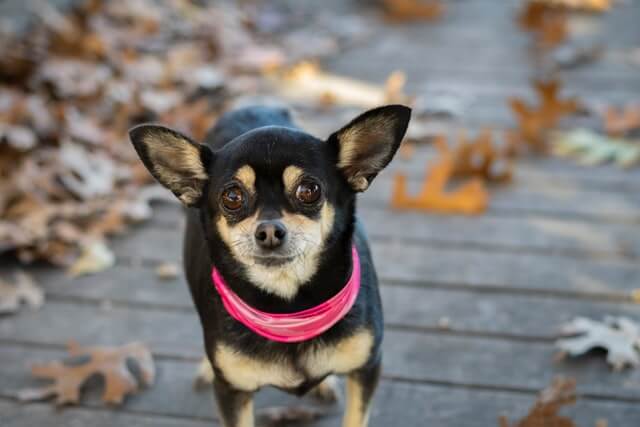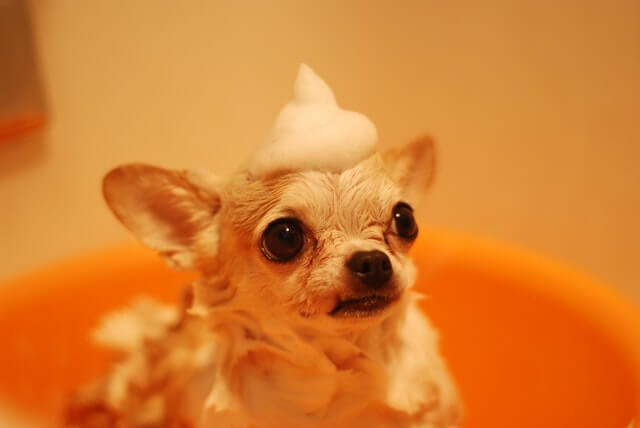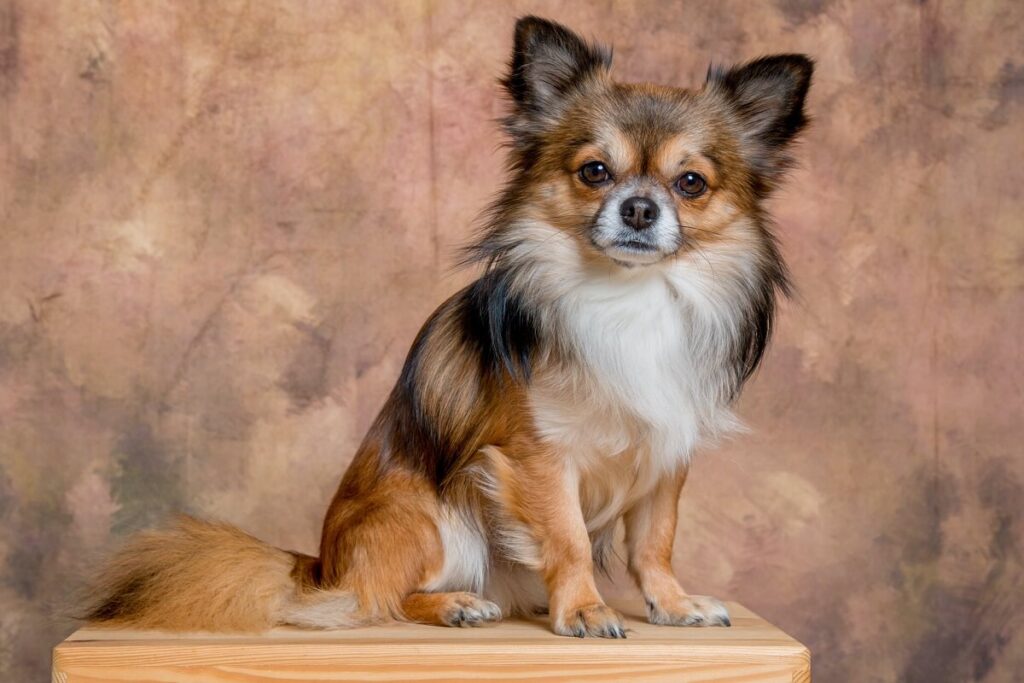With the personality of a king packed in a tiny body, Chihuahua rules the hearts of his admirers with his dark big eyes and classy demeanor! This “Purse dog” has a lineage going back to pre-Columbian times and is now a national symbol of Mexico. Chihuahua is a graceful, intelligent, and affectionate breed with a balanced demeanor like that of a Terrier. They are bred to produce various varieties of this breed with beautiful coat colors and markings.
Being small but energetic needs different nutrition and grooming. Learn about the history, personality, and features of Chihuahua. There are some misconceptions about the temperament of this breed that we are going to rule out in this article. If you do not know how to take care of this breed, what should you feed a Chihuahua, or is it the right breed for you, do not worry! We have enlisted all the characteristics and information about Chihuahuas in this article so you could narrow down your choices and decide if it suits you or not.
History
Chihuahua is thought to be descended from a central and South American dog Techichi. Cave paintings from Toltec Civilization, in the 9th century, illustrate a dog similar in looks to Chihuahua. They lived in temples and were used in Aztec rituals because they were thought to have mystic powers.
Another theory is that they are the descendants of small hairless dogs from China. They were brought to Mexico by Spanish Traders. They were considered native dogs of the Mexican state of Chihuahua in the 1850s. The long-haired variety of Chihuahua was created by their breeding with Papillon or Pomeranian.
Physical Features
With an apple-shaped head, short pointed snout, round and dark eyes, Chihuahuas are always ready to melt your heart. Some may have a slightly longer and bigger head, shaped like deer. They have bat-like ears that are slightly disproportionate to the rest of the body. There is a small, high, and curb deal as to their beauty. They also have varieties of coat colors and lengths. Their fur is mostly short, straight, or wavy sometimes.
Coat Colors and Patterns
Chihuahuas not only come in different colors but different shades of the same color with unique markings and patterns. These unique markings and coat colors make this breed different from all others. They come in 39 coat colors, nine of which are recognized by AKC. The most common coat colors in Chihuahua are:
- Black (rarest)
- Blue and tan (grayish hue)
- Chocolate
- Chocolate and tan
- Cream
- Fawn
- Fawn and white
- Red
Some of the common markings on varieties of Chihuahua are:
- Black Brindling
- Black Mask
- Black Sabling
- Spotted On White
- White Markings
- Black Mask, White Markings
- Blue Mask
- Cream Markings
- Fawn Markings
- Red Markings
- Merle Markings
Dimensions
Chihuahua is a small dog breed. Most of them weigh less than six pounds and reach only 6 to 9 inches of height. Smaller varieties of this breed such as Teacup Chihuahua weigh 5 pounds with a height of 9 inches. Chihuahua puppies are also very small as compared to the puppies of other dog breeds. Reaching up to only 3-4 inches in size Chihuahua puppies weigh only 2-5 ounces. Owing to their small size and delicate bones, they should not be left with children alone.
Types of Chihuahuas

Chihuahuas come in various varieties. These are categorized on the basis of their appearance, coat type and color, and breed mixes. Some of the most common types of Chihuahuas are:
- Short-Hair Chihuahuas
- Long-Hair Chihuahuas
- Chillier Chihuahua
- Chiweenie Chihuahua
- Apple Head Chihuahuas
- Deer Head Chihuahuas
- Teacup Chihuahuas
- Pear-Headed Chihuahuas
- Color-Named Chihuahuas (such as fawn Chihuahuas)
Personality Traits
The tiny body of Chihuahua is packed with the biggest personality making him more appealing to us. Besides being intelligent and fast, they are affectionate companion dogs. They are fun-loving, busy, and very close to their loved ones. Their close bond with a single person often makes them very demanding.
Being enthusiastic and eager in nature, they perform well in agility and obedience training. They are stubborn against harsh treatments. Therefore, use positive reinforcement for training them. Thanks to their alertness, Chihuahuas make excellent Watch Dogs. As they are distrustful of strangers, they need proper socialization with other people and animals.
How to take care of Chihuahuas?

Grooming
Chihuahuas are mostly short-haired dogs, so it is not hard to groom them. But their varieties with the larger coat need proper care and grooming. In any case, you should brush your dog regularly, about three to four times a week, especially if he has a lengthy coat. Keep your dog’s nails trimmed.
Clean his ear to avoid clogging and infection. Also, you must bathe your Chihuahua once in a month or two. Brushing his teeth may be a tough task but try to brush them daily. If your dog has a smaller fur length, he could be more prone to shivering in the cold. Therefore, provide them with a blanket, dog sweater, or coat in cold weather.
As you groom them, check for the signs of infection or inflammation on the skin, in the mouth, ears, eyes, and feet. This careful examination can prove beneficial in the early diagnosis of a potential health risk.
Exercise
Contrary to the popular belief, small dog breeds are more energetic and active than the larger ones, therefore they need regular exercise to meet their energy. Chihuahua, being a playful and energetic breed, tend to run and play frequently. Thanks to their small size, they get enough exercise even in a small room.
Running after toys, and trotting around following their loved ones is enough to meet their exercise needs. But if he is oversized or loves outdoor visits, take him for walks. Slow walks will keep him in the best of shape and health. Beware! They tire fast. so, if you see them painting, avoid overexerting them and carry them home.
Chihuahuas tend to run off guard, sometimes step outside the yard to discover their surroundings. You should never leave them alone. They are not safe outside the home in open surroundings. Raptors such as hawks, coyotes, or other larger dogs that could easily approach them in your yard can be a danger for them. They are bred as companions so be in their company as much as possible.
Training
Chihuahua is an intelligent and alert breed. Being affectionate towards his loved ones, he is always eager to please and respond positively to training practice. They know they are adorable and can learn to get their way with the people who adore them. Therefore, during the early stages of your interaction with them, you must keep yourself in charge.
Chihuahua puppies must be refrained from doing anything that could become a problem for you once he steps into adulthood. Owing to their stubborn but sensitive temperament like a Terrier, you should use a strong but gentle approach during training. Chihuahuas are known to excel in canine sports and obedience training.
One thing that causes problems for Chihuahua owners is their high-pitched bark and separation anxiety. You can keep them busy to avoid such behaviors. Play games with them, make them learn new tricks, and train them to be home alone with positive reinforcement.
Nutrition
You can feed Common dog foods high in nutritional value to Chihuahuas. Feed them according to their weight, age, size, metabolism, and activity levels. Generally, 1/4 to 1/2 cups of high-quality dry food a day, or 200 calories per day are enough for an adult dog of this breed. Do not overfeed them, as they are prone to overeating. It can lead to obesity and other health issues.
Avoid feeding them food with high-fat content, choked bones, and chemical additives. Treats are important for their training and engagement, but too many can lead to obesity. Also, learn which human foods dogs can eat and which should not be given to them.
Feeding the right dog food is important because low-quality food can cause various health issues in Chihuahuas like heart disease, kidney failure, and diabetes. Visit your vet to get an idea about the right type and amount of food according to your Chihuahua weight.
Health
Most Chihuahuas are healthy dogs except the ones with genetic disorders. Normally they are prone to common diseases in dogs like the common cold, fever, diarrhea, vomiting, and alike. Some genetic disorders can affect the breed adversely. Breeders must genetically screen their stock to rule out the possibility of inheriting such disorder and ensure the production of healthy puppies. Some common health issues that affect Chihuahua are:
- Potential heart problems (Patent ductus arteriosus, mitral valve disease)
- Eye diseases
- Hypoglycemia
- Pulmonic Stenosis
- Patellar luxation (loose kneecaps)
- Idiopathic epilepsy
- Hydrocephalus
- Open Fontanel
- Shivering
- Heart murmurs
More about Chihuahua
Why are Chihuahuas so aggressive?
Chihuahua is just as aggressive as any common dog breed. They just have a bad reputation of being aggressive due to their excessive barking and dominant nature. Their high-pitched bark is really harsh which makes them look aggressive. They are also possessive about their territory and protective of their owners. They do not get along well with strangers. With basic training, you can bring positive change to his behavior.
How well do they get along with children and other pets?
Chihuahuas get along well with the children. But Chihuahuas are not recommended for families with children under the age of eight. Because leaving them with children could be a disaster for them. These are very small dogs with delicate bones so could easily slip from a child’s hands. This can lead to a serious injury.
Chihuahua does not tend to defend himself against children. Teach children how to hold them, play with them or how to approach them. This breed also bonds well with the other pets especially cats and larger dogs if you introduce them at an early age.
Are Chihuahuas good for novice owners?
Yes! This breed is ideal for novice owners. They are small in size so require less grooming, they are easy to train and respond well to positive reinforcement. They do not require much exercise and food. They can also adapt to apartment living and can travel easily. With little training, you can leave them home alone but not for longer periods. So as a new pet parent, you can adopt a Chihuahua.
Why is Chihuahua hard to train?
Chihuahua is not hard to train. It is an intelligent breed, always eager to learn and please its owners. They respond well to treats, rewards, and positive attributes. Due to their dominant nature, they love to be in charge. So during training, let them feel they are in charge. Take them with you everywhere you go to socialize them. In this way, you can easily train them.
Is Chihuahua prone to separation anxiety?
No! Chihuahua is not prone to separation anxiety. You can leave them alone but keep certain things in mind. Never leave them alone in the yard alone or outside your home. Adult Chihuahuas can be left alone for 8-10 hours. But never leave a puppy for more than 2 hours. Before leaving them, confine them to a space and make sure to meet their basic necessities.
Is Chihuahua a family dog?
Chihuahua is a good family dog. They were bred as companion dogs so they make excellent family dogs. If you have children under the age of 8-10, Chihuahua is not for you. They are at risk of getting an injury while playing with smaller children. If you have older children, they must learn how to play with or approach a Chihuahua. For families with smaller children, other breeds like Terrier, Labrador, or Husky are better.
Final Thoughts!
Now you know what kind of dog a Chihuahua is and how well it can be as a family pet. This article mentions all the traits and information about Chihuahuas. We hope you have gotten an idea of how compatible a Chihuahua can be with you. So if you want to adopt one, do not waste your time and bring this energetic pouch to your home.





